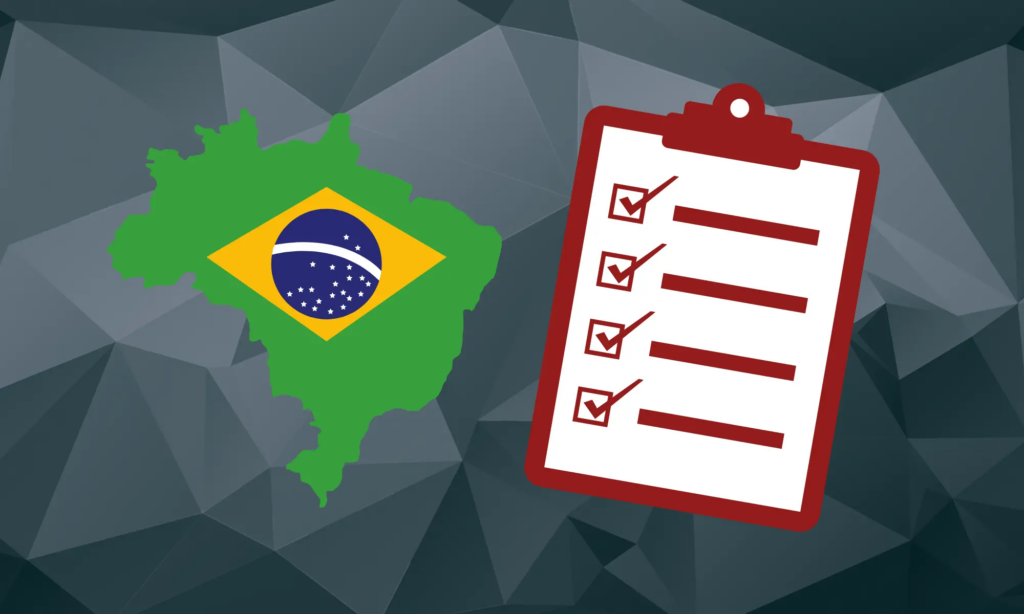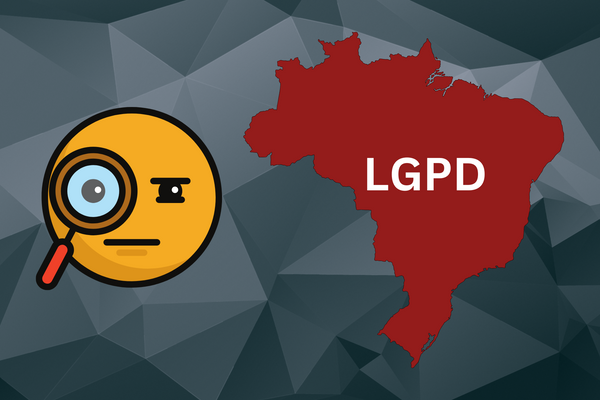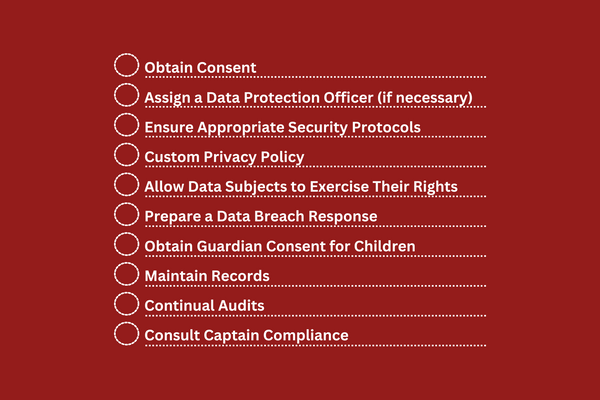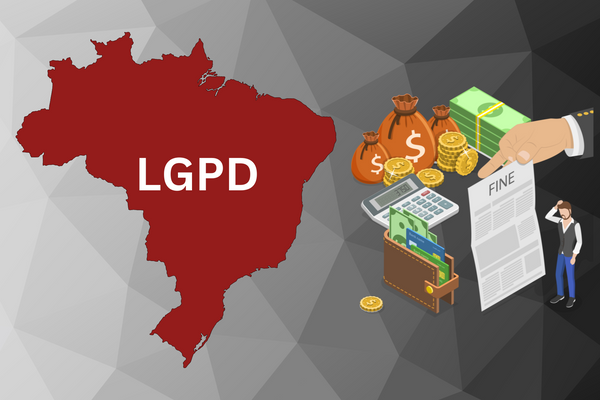
Keeping everyone’s data safe is important but can be confusing at times. It’s even more tricky when you have to follow laws from different countries.
One of the most prominent laws that many businesses have to follow is Brazil’s LGPD. That’s why we made a special LGDP compliance checklist to help you follow its rules. This article will guide you through all the important steps.
You’ll learn how to pick a special person to look after data, how to treat data correctly, and what kind of money trouble you could get into if you make a mistake. We’ll give you a step-by-step plan to make sure you’re doing everything you need to protect the data you have.
Let’s dive in.
Key Takeaways
Keeping people’s data safe is a big deal, especially in Brazil. They have a law called LGPD that tells businesses how to handle personal info. Following this law isn’t just a must-do. It’s really important for your business.
Our LGPD checklist is like a map that helps you do this right. You’ll learn how to ask people if you can use their info, how to keep it safe, and what to do if something goes wrong.
If you don’t follow LGPD, you could get into big trouble. You’ll have to pay a lot of money, people may stop trusting your brand, and you could face more severe disciplinary action.
The Brazilian General Data Protection Law (LGPD) is a critical piece of legislation for any organization processing the personal data of individuals in Brazil. To ensure compliance in 2026, businesses must take a proactive and comprehensive approach. Here’s an “Ultimate Guide” checklist:
LGPD Compliance Checklist for 2026:
1. Data Governance and Management:
- Data Mapping and Inventory:
- Conduct a thorough data mapping exercise to identify all personal data processed, its location, and its flow within the organization.
- Create and maintain a comprehensive data inventory.
- Legal Basis for Processing:
- Identify and document the legal basis for each data processing activity (e.g., consent, legitimate interest, legal obligation).
- Ensure that the chosen legal basis is valid and appropriate.
- Data Minimization:
- Implement policies and procedures to ensure that only necessary personal data is collected and processed.
- Data Retention:
- Establish clear data retention policies and schedules, ensuring that personal data is not retained longer than necessary.
2. Consumer Rights and Transparency:
- Privacy Policy:
- Develop and maintain a clear and accessible privacy policy that informs data subjects about their rights and how their personal data is processed.
- Data Subject Rights (DSARs):
- Establish procedures for handling data subject access requests (DSARs), including access, rectification, erasure, and portability.
- Ensure timely and accurate responses to DSARs.
- Consent Management:
- Implement a robust consent management system to obtain and manage valid consent from data subjects.
- Ensure that consent is freely given, informed, and unambiguous.
3. Security and Incident Response:
- Data Security Measures:
- Implement appropriate technical and organizational security measures to protect personal data from unauthorized access, use, or disclosure.
- Conduct regular security assessments and penetration testing.
- Data Breach Response Plan:
- Develop and implement a data breach response plan, including procedures for notification to the National Data Protection Authority (ANPD) and affected data subjects.
- Ensure timely and accurate breach notifications.
- Risk Assessments:
- Conduct regular risk assessments to identify and mitigate potential data privacy risks.
4. Organizational and Contractual Compliance:
- Data Protection Officer (DPO):
- Determine whether your organization is required to appoint a DPO and, if so, appoint a qualified individual.
- Third-Party Contracts:
- Review and update contracts with third-party vendors and processors to ensure LGPD compliance.
- Include data protection clauses in all relevant contracts.
- Employee Training:
- Provide regular training to employees on LGPD requirements and data privacy best practices.
- ANPD Compliance:
- Stay up to date on ANPD guidance and regulations.
- Prepare for potential ANPD audits.
Key Considerations for 2026:
- Increased ANPD Enforcement:
- Expect increased enforcement actions by the ANPD, emphasizing the importance of ongoing compliance.
- Technological Advancements:
- Adapt to evolving technologies, such as AI and IoT, and their impact on data privacy.
- International Data Transfers:
- Pay close attention to regulations regarding international data transfers, ensuring compliance with LGPD requirements.
- Adaptation to evolving case law:
- Keep up to date on how the LGPD is being interpreted in the Brazilian courts.
By following this checklist, organizations can significantly enhance their LGPD compliance posture and protect the personal data of individuals in Brazil.
What is the LGPD?

In Brazil, data privacy is a big deal, and keeping people’s info safe is a top priority. They have a law called Lei Geral de Proteção de Dados (LGPD) that came into effect in September 2020.
This law is for any business, even outside Brazil, that engages in data processing of information from people living in Brazil. Some people think it’s like Europe’s GDPR, but LGDP is different from the GDPR.
It has its own unique rules you need to follow. As we use the internet more, the chance of bad things like data leaks goes up. LGPD is Brazil’s way to fight that. If you don’t follow the law, you can get fined a lot of money, and people will trust your business less.
If your business is in Brazil or handles data from people there, you have to take LGPD and data privacy very seriously.
The law tells you how to be open about what you do with people’s data, a critical aspect of corporate compliance. It also says you must have someone in charge of keeping data safe, called a Data Protection Officer. So, LGPD isn’t just another rule. It’s a big framework on how to respect and protect people’s information.
Key Principles of LGPD
The LGPD outlines a set of key principles that serve as the backbone of the regulation.
These principles aim to ensure that businesses handle personal data with utmost care, responsibility, and transparency. Understanding these principles is essential for businesses as they form the basis of LGPD compliance.
Transparency: Clear and open about how data will be used.
Lawfulness: Data processing must have a legitimate basis.
Purpose Limitation: Data must be collected for explicit and legitimate purposes.
Data Minimization: Only necessary data should be collected.
Accuracy: Data must be accurate and up-to-date.
Security: Adequate protections must be in place.
Accountability: Businesses are responsible for data safety.
Necessity: You should only collect information if it’s really needed.
Suitability: Your business must only use personal data in the context it was taken.
Non-Discrimination: Data cannot be used in a discriminatory manner.
These important rules focus on being clear and fair when handling people’s personal information. The goal is to keep that information safe. For businesses, it means that all steps, from collecting data to using and keeping it, must follow these important guidelines.
Failure to adhere to them risks fines and can undermine the trust that consumers place in a business. Compliance with these principles is a critical element of a well-rounded compliance plan.
Who Does the LGPD Apply to?
Brazil has a law called LGPD that applies to businesses that process data of Brazilian people. It doesn’t matter if your business is in another country. If you have data from Brazilian people, you have to follow this law.
It’s not just for private businesses. Government offices and nonprofit groups also have to follow it. This makes sure that everyone in Brazil can trust that their data is safe, no matter where it is.
What kind of information are we talking about? The law covers all sorts of personal data. This means not just basic stuff like your name or email. It also means more private things like your health records or what religion you follow.
If you’re running a business, you need to check all the ways you collect and use people’s information.
You have to know what this law says you can and can’t do. If you don’t follow the rules, you could get in trouble and have to pay a lot of money as a fine. So it’s really important to understand this law completely to make sure your business is doing things the right way.
LGPD Compliance Checklist

Understanding Brazil’s LGPD law can feel like a puzzle, but having a good checklist can really help. This checklist gives businesses a step-by-step guide to make sure they are doing everything right according to LGPD rules:
Obtain Consent
The cornerstone of LGPD compliance is obtaining clear consent from data subjects (Brazilians) before processing their personal data. This means that businesses must explicitly ask for permission and explain the purpose for which the data will be used.
Pre-ticked boxes or implied consent strategies won’t suffice. An individual’s consent must be documented, and they must also be provided an easy way to withdraw it, should they choose to do so.
Assign a Data Protection Officer (if necessary)
The LGPD law instructs certain businesses, especially those involved in complex data processing, that they must have a designated person called a Data Protection Officer (DPO). They are the go-to person for making sure the business follows all the rules about keeping personal data safe, according to LGPD.
Ensure Appropriate Security Protocols
Having solid security is necessary for keeping people’s personal info safe. Businesses should use hard-to-break codes to lock data, keep that data secure, and check often to ensure their security is still up to par. This helps to keep the data safe and away from unauthorized people.
Custom Privacy Policy
A privacy policy tailored to LGPD requirements is a must. It should outline how personal data is collected, used, and stored and must be easily accessible to all data subjects. Keeping this policy up-to-date is crucial in maintaining compliance.
Allow Data Subjects to Exercise Their Rights
Under LGPD, data subjects have specific rights, such as the right to access, amend, or delete their personal data. Businesses should establish straightforward subject access procedures allowing individuals to exercise these rights.
Prepare a Data Breach Response
Having a plan of action in the event of a data breach is crucial for LGPD compliance. Such a plan should outline the steps to be taken to mitigate the breach and specify how affected individuals will be notified.
Obtain Guardian Consent for Children
For data subjects under the age of 18, obtaining consent from a legal guardian is essential. This should be clearly indicated in the consent form and verified to ensure full compliance.
Maintain Records
Keeping detailed records of all data processing activities, consent forms, and other related documents is vital. These records will be your evidence of compliance if audited by the Brazilian Data Protection Authority.
Continual Audits
Regular audits of your data protection mechanisms are necessary for ongoing compliance. These audits can identify any areas of non-compliance and offer opportunities for improvement.
Consult Captain Compliance
Consulting with a professional in the field of personal data protection, such as us at Captain Compliance, can provide invaluable insights. We specialize in data protection compliance services and can help tailor your data compliance solutions to meet LGPD requirements.
By following this checklist, choosing to outsource compliance, or implementing specialized compliance solutions, businesses can substantially reduce the risk of non-compliance and ensure that they are in line with LGPD regulations.
LGPD Fines for Non-Compliance

One of the most concerning aspects of LGPD for businesses is the severe penalties for non-compliance. The fines can range up to 2% of a business’s revenue in Brazil for the previous fiscal year, capped at 50 million Brazilian Reais per violation.
The fines for not following the rules are more than just money you have to pay. They also remind us how important it is to keep people’s information safe in our digital world. But losing money isn’t the only thing businesses should be worried about. If you break the rules, people might find out about it.
This can really hurt how people see your business and make them not want to be your customers anymore. You could even lose some of your business to other businesses. In really serious cases, the National Data Protection Authority can stop your business from using people’s information.
Plus, the people whose personal data you have can also take you to court if you don’t protect their information. So, knowing and following LGPD rules isn’t just about doing what the law says. It’s also a really important plan for your business.
Closing
Navigating the maze of LGPD compliance might seem overwhelming, but it’s a crucial part of doing business in today’s digital world.
Taking these steps and possibly undergoing compliance training is vital for protecting your business and the sensitive personal information you handle
So what should your next steps be after reading this guide? The journey to full compliance doesn’t have to be a solo effort.
Captain Compliance specializes in compliance services helping businesses like yours navigate the complexities of data protection laws, including the LGPD. We can help you comply with these rules and principles.
Whether you need to appoint a Data Protection Officer, draft a custom privacy policy, or need guidance on proceeding in case of a data breach, we’ve got you covered. Contact us today so we can assist you!
FAQs
How is LGPD different from GDPR?
Both the LGPD in Brazil and the GDPR in Europe want to keep people’s personal information safe. But they have different rules and ways to ensure businesses do it right. For instance, in Brazil, the LGPD says some kinds of businesses have to pick a person to be in charge of keeping data safe. This person is called a Data Protection Officer.
Here’s our article comparing Brazil’s LGPD and GDPR.
What constitutes ‘personal data’ under LGPD?
Under LGPD, personal data includes any information that can identify an individual. This ranges from basic details like names and email addresses to more sensitive information such as health records, racial or ethnic origin, and religious beliefs.
This is our page on sensitive personal information.
Is appointing a Data Protection Officer mandatory?
Appointing a Data Protection Officer is mandatory for certain businesses, particularly those involved in complex data processing activities. The officer serves as the point person for all data protection matters within the business.
Find out if your business needs a data protection officer here.
What should a business do in case of a data breach under LGPD?
If a data breach occurs, the business must have a predefined plan of action that includes notifying affected individuals and taking steps to mitigate the breach. Failure to act swiftly and responsibly can lead to additional penalties.